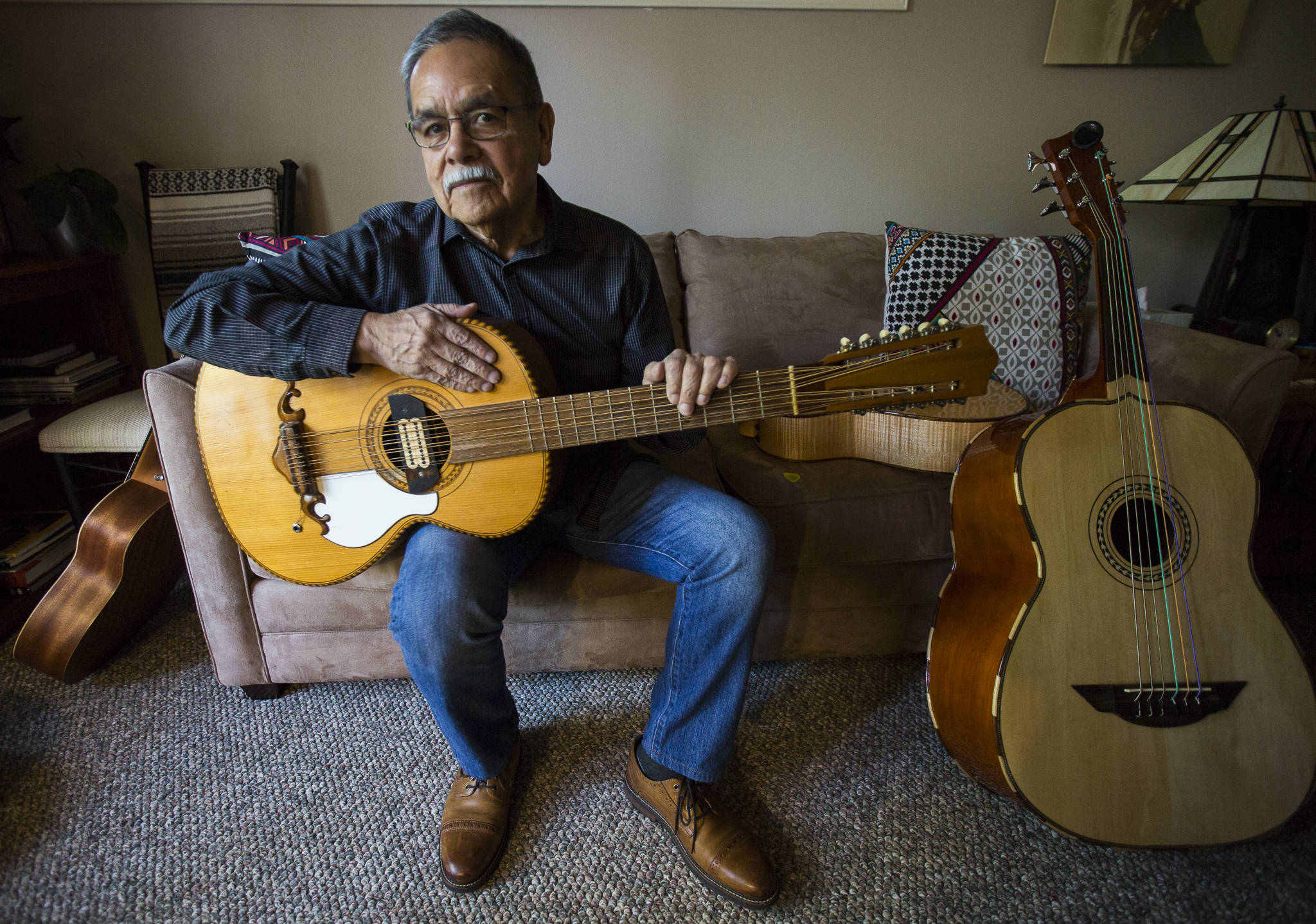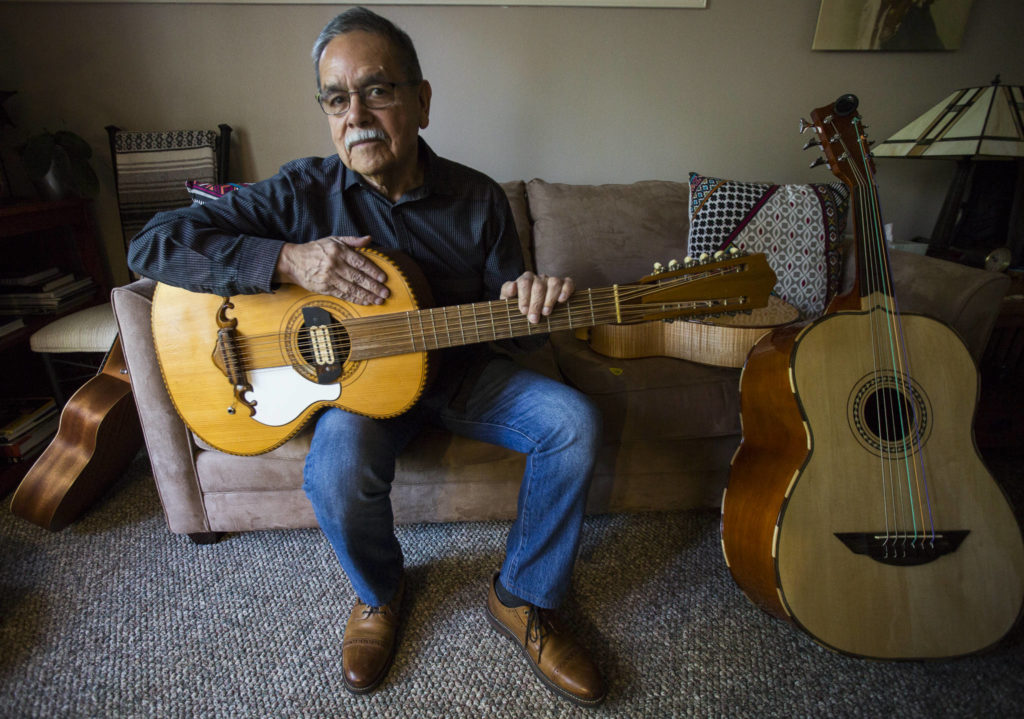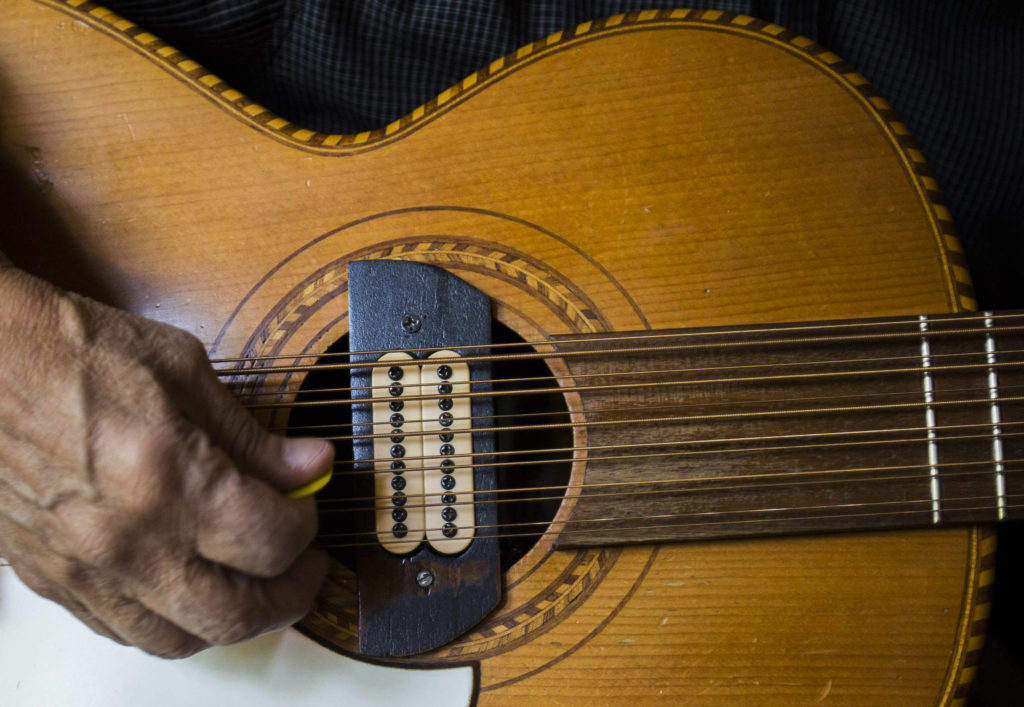Juan Manuel Barco was one of nine children in a family that followed the crops.
They worked in the cotton, asparagus, cherries, tomatoes, corn, green-onion and radish harvest across the country, from Michigan to Texas, before finally settling in California.
No matter where they were living, music was interwoven in their lives. Juan’s mother liked to sing. And as they traveled across the country in their ‘41 Chevy, they listened to the local AM radio stations, signals with a range of about 50 miles that would fade into one another. Polkas in Minnesota, country music in Oklahoma, rock ‘n’ roll in California.
When he was young, his parents gave him a guitar.
“In those days to get something like that was pretty special for a farm-working family, because they didn’t have money to spend on anything,” he said.
That gift would influence Barco’s life. He grew up to be an accomplished musician. Now 75 and living in Brier, he recently was selected for a Heritage Award by The Washington State Arts Commission. He’s one of eight people and organizations that received awards this year.
Barco was recognized for his compositions and performances in the Mexican-American ballad style of music known as corrido, focusing on issues such as land rights, immigration, labor, political action and cultural identity.
“I figured it was time for him to get the recognition that he deserved,” said Jens Lund, who nominated Barco for the award.
Lund, a folklorist, worked for the Washington State Parks and Recreation Commission for a decade, hiring musicians to play at cultural events. During that time, he heard about Barco’s songs of the migrant worker experience, but didn’t know how to contact him.
In 2001, Lund was attending a poetry gathering in New York City when he spotted a man at a reception wearing a green T-shirt with the word “Washington” on it.
Intrigued to meet someone from his home state, Lund introduced himself. When he heard Barco’s name, he was amazed, responding: “The Juan Barco?”
A few years later, Lund was organizing Latino-themed events for the parks commission and tracked Barco down again. It was the beginning of a series of gigs Lund helped arrange for Barco, who he describes as self-effacing almost to a fault.
Although Barco has a CD, “Migrant Farmworkers’ Song Book,” there’s no place to buy it. “You can ask me for one,” he said. “I just make a copy and send it to them.”
“The songs are so beautiful,” Lund said. One of them, “Don Luis El Tejano,” is essentially the life story of his father, Lund said, and has become a farmworkers’ anthem.
“A lot of his corridos were really a retelling of his life as a child growing up,” Lund said. “During his childhood, he didn’t know he wouldn’t necessarily be picking vegetables for the rest of his life.”
Barco was born in Coal Mine, Texas, in 1944, a village south of San Antonio. As he grew up, his family was always on the road. “We were never settled anywhere. I always sang, and then l learned to read and write in Spanish at 5 years old,” he said.
Fellow farmworkers would pay him pennies and nickels to read letters sent to them.
“I remember when I began playing the guitar at 6 years old in Hollandale, Minnesota,” he said. Church members asked his parents if they could take him to Mankato, a city about an hour away, to sing and play at a church fundraiser.
“I remember being scared but excited at the same time,” he said. “I remember they sat me on a table and I sang all the songs l knew, plus I made up words to melodies. People kept dropping money all around me. The ladies let me keep $43. I didn’t make that much in a night until 1975.”
In 1956, the family traveled to California, but it was a rocky landing. He has a vivid memory of being 12 years old, sitting in a car when the temperature hit 113 degrees. All they could afford for meals were Wonder Bread bologna sandwiches.
The family ended up moving into a farmer’s one-room shed, picking prunes for a season, before finally settling in Campbell, California, when his father got a job in construction.
In 1959, the family moved to Milpitas, where his dad purchased the family’s first home.
The Barco children continued to work summers in agriculture and fruit orchards to pay for school clothes until they graduated from high school.
Barco was drafted into the Army at age 20 as the number of American troops in Vietnam began its initial surge.
He was sent to Fort Lewis near Tacoma in 1966. He said he was sitting on a plane bound for Vietnam when the Army discovered there were too many people on board for it to depart.
To decide who would have to leave the flight, they began calling names alphabetically — his was one of only 10 men whose names were called.
“I was saved by my last name,” he said.
It wasn’t the only unintentional “save” the Army gave him. They sent him to what was then known as the Yakima Firing Center for what was supposed to be a two-week stay, but they lost his orders.
While there, he got jobs at the NCO and officer’s clubs. When bands would come to entertain, Barco told them he played guitar. He began sitting in on country music gigs. He went on to display a talent for a variety of musical genres, including jazz and rock ‘n’ roll.
He later earned his master’s degree in social work from the University of Washington. He worked for the state Department of Social and Health Services for 35 years. “Then in the mean time I was playing,” he said. “My work life and playing different bands trying to stay true to my roots.”
Over the years, he has performed in venues such as schools, at state parks including Deception Pass, at the Peace Arch at the U.S.-Canada border, Seattle’s Folklife Festival and at César Chávez Park in Seattle.
You might now see him playing with Bobby Medina, a trumpeter who performs Latin, jazz and world-fusion music.
When asked what he plans next, he said “I’m going to concentrate on doing my own thing,” taking people on imaginary migrant trips through his music.
“I may become a street musician,” he said “or play at local festivals where I can just be myself.”
Sharon Salyer: 425-339-3486 or salyer@heraldnet.com.
Talk to us
> Give us your news tips.
> Send us a letter to the editor.
> More Herald contact information.



























